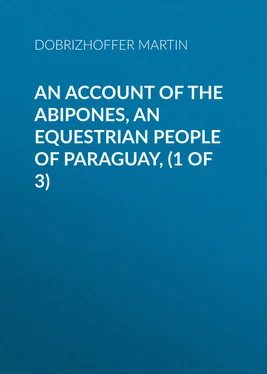Martin Dobrizhoffer - An Account of the Abipones, an Equestrian People of Paraguay, (1 of 3)
Здесь есть возможность читать онлайн «Martin Dobrizhoffer - An Account of the Abipones, an Equestrian People of Paraguay, (1 of 3)» — ознакомительный отрывок электронной книги совершенно бесплатно, а после прочтения отрывка купить полную версию. В некоторых случаях можно слушать аудио, скачать через торрент в формате fb2 и присутствует краткое содержание. Жанр: foreign_antique, foreign_prose, на английском языке. Описание произведения, (предисловие) а так же отзывы посетителей доступны на портале библиотеки ЛибКат.
- Название:An Account of the Abipones, an Equestrian People of Paraguay, (1 of 3)
- Автор:
- Жанр:
- Год:неизвестен
- ISBN:нет данных
- Рейтинг книги:3 / 5. Голосов: 1
-
Избранное:Добавить в избранное
- Отзывы:
-
Ваша оценка:
- 60
- 1
- 2
- 3
- 4
- 5
An Account of the Abipones, an Equestrian People of Paraguay, (1 of 3): краткое содержание, описание и аннотация
Предлагаем к чтению аннотацию, описание, краткое содержание или предисловие (зависит от того, что написал сам автор книги «An Account of the Abipones, an Equestrian People of Paraguay, (1 of 3)»). Если вы не нашли необходимую информацию о книге — напишите в комментариях, мы постараемся отыскать её.
An Account of the Abipones, an Equestrian People of Paraguay, (1 of 3) — читать онлайн ознакомительный отрывок
Ниже представлен текст книги, разбитый по страницам. Система сохранения места последней прочитанной страницы, позволяет с удобством читать онлайн бесплатно книгу «An Account of the Abipones, an Equestrian People of Paraguay, (1 of 3)», без необходимости каждый раз заново искать на чём Вы остановились. Поставьте закладку, и сможете в любой момент перейти на страницу, на которой закончили чтение.
Интервал:
Закладка:
Think not that such egregious merits went unrewarded by royalty: he was honoured with the rank of commendador in the equestrian order of St. Iago, made knight of the order of St. Janeiro, and even created military governor of Madrid. Some years after, he received from King Charles the golden key, a mark of singular prerogative in the court. Rumours of the Paraguay disturbances having reached Spain, he was invested with the government of Buenos-Ayres, and commanded to sail thither, to compose the minds of the Guaranies, and forward the delivery of the seven towns, accompanied by five hundred regular cavalry-men, chosen from every regiment of light-armed horse which Spain possesses. To these were added seven companies of foot, consisting of runaway Germans, French, Italians, Poles, and even Russians, collected, a few years before, by a Spanish lieutenant at the surrender of Parma. Most of these were veterans – fierce warriors, fresh from European battles. As often, therefore, as Paraguay found them an enemy, they did not let their help be wanted; but being used to running away at home, they did not forget their old propensities amongst the antipodes, for they sometimes fled in troops, from the desire of marriage and a life of less hardship.
During the voyage, Zevallos was anxiously devising methods to tranquillize Paraguay, which he imagined to be embroiled with intestine war, and devoted to King Nicholas. On coming in sight of the shores of Buenos-Ayres, lest by a sudden landing he should endanger his men, he despatched some soldiers in a boat to feel the way before them. Perceiving a multitude assembled on the bank of the river Plata, they hailed them from afar with the usual interrogation of the Spanish guards, Quien vive? – Who reigns here? With one voice they exclaimed, that Ferdinand the Sixth was their king, and should remain so as long as they lived. This was more than enough to quiet the fears of the soldiers, who, deceived by European reports, imagined that King Nicholas would be dethroned with the utmost difficulty, and at the expense of their own and much foreign blood. Zevallos himself was astonished when he learnt that the Guaranies had long since been brought to submission. He had therefore no fighting with the Indians, but many contentions with the officers of the Portugueze faction, among whom the Marquis Val-de-Lirios held a distinguished place, as possessing, from royal investment, full power of determining every thing connected with the stipulated exchange of territory with the Portugueze. Equitable in other respects, but too studious of Queen Barbara's favour, he consulted principally the advantage of the Portugueze; while Pedro Zevallos, who laboured for the safety of his country, rather than the favour of his queen, endeavoured to oppose him. Having impartially investigated all the occurrences of the revolt previous to his coming, and discovered that many things had been written against the Guaranies and their missionaries, without foundation, and that others were basely exaggerated, he transmitted to the court a correct statement of the matter, standing forth, on a sudden, the vindicator and eulogist of those very Guaranies he had come to put down and punish.
Tucuman, another division of Paraguay, extends very widely in every direction: on the East it reaches the territory of Buenos-Ayres; on the West, the mountains of Chili; on the South, it is bounded by immense plains, running out as far as the Magellanic region; and on the North, by the district of Tariji. It has a governour and bishop of its own, the one of whom resides at Cordoba, the other at Salta, the capital cities. Cordoba is famous for the beauty of its houses, the number and opulence of its inhabitants, and a celebrated academy. In the richness of its pastures and the multitude of its cattle, it has no superior. Many thousand mules are annually exported from its estates to the Peruvian market. Lofty rocks rise in every part of the Cordoban district. A few leagues distant, on the banks of the river Pucara, which washes the city, is a place where lime is made. Coming to the place one night, when the sky was calm and the air tranquil, I heard terrible noises like the explosion of cannon. But the natives assured me, that these sounds were common to the neighbouring rocks and happened perpetually. The air, confined in the cavities of the mountain, and attempting a forcible passage through the chinks, when stopped by opposing rocks, and reverberated by their windings, bellows after this fearful manner. In the city of Cordoba itself, a hollow murmur, resembling the knocks of a pestle in a wooden mortar, is frequently heard by night. This low mournful sound runs from one street to another, and is called by the Spaniards el pison , or the paving-hammer. The ignorant vulgar believe that some spectre or goblin haunts the streets; as for me, I am convinced that it originates in subterraneous wind, which, forcing its way through the interstices of the earth, makes violent endeavours to find a vent; for I observed the lands near the city excavated and fissured in many places by earthquakes. The city of Salta derives its principal profits from the passage of mules. St. Iago del Estero, a very ancient city of Tucuman, was long the seat of a bishop, and afterwards of a governour. The houses are, however, neither large nor elegant. Pope Innocent the Twelfth transferred the episcopal see from hence to Cordoba. The city of St. Iago boasts some tolerably handsome churches. It is washed by the Rio Dulce, which, during its annual flood, rolls down mountains of sands; excellent bulwarks against the cannon of assailants, if the city were ever besieged. The inhabitants of the district of St. Iago are distinguished alike for the greatness of their valour and the scantiness of their means in the wars against the savages. From the trade in wax, which they collect in their distant woods, and from that in corn, they derive some profits, inadequate, however, to recompense them for the hardships they undergo. Their herds are few, from the scantiness of the pastures: for the plains, which are bounded on every side with sand, supply a slender provision of grass, by reason of the frosts in winter and the drought in summer. In winter, when the fields are bare, I have observed the horses cropping the branches of trees, nay, sometimes gnawing their trunks. Did not the Rio Dulce yearly overflow its banks, the soil would produce nothing esculent. This flood generally takes place about January, from the melting of the snows on the Chili and Peruvian mountains. The fertility of the soil is at that time incredible, producing abundant crops of corn, and water-pumpkins of great size and sweetness. Clouds of a remarkable hue announce the event to the natives. The woods around St. Iago abound in the alfaroba , which is converted into a drink, or a sweet-flavoured bread, and taken in either form is possessed of medicinal virtues. The Rio Dulce too supplies the inhabitants of its shores with food. Annually, but at no certain time, shoals of a fish called zabalo hurry down the river, and are taken by the hand, in such numbers that, during the period of their arrival, the lower orders need no other provision.
The city of St. Iago formerly numbered many Indian colonies within its jurisdiction, the ruins of which are now alone visible, the inhabitants having perished of want or the small-pox. Some little villages yet remain: Matarà, Salabina, Moppa, Lasco, Silipica, Lindongasta, Mañogasta, and Socconcho; they are governed by secular priests, and inhabited by a very few Indians, employed in the service of the Spaniards who live amongst them. Their condition is miserable, their barbarity beyond conception, their houses mere hovels, and their churches little better. The same may be said of all the villages remaining in the other districts of Paraguay.
The little town of St. Miguel, situated near the Chili mountains, is surrounded with hills, plains, large streams, and pleasant woods adorned with lofty forest trees, which supply the whole province with cedar planks, and timber fit for the largest houses. Rioja and St. Ferdinand, or Catamarca, little towns, buried amongst mountains, gain their principal returns from the culture of vines and red pepper, which is in daily use amongst the Spaniards. Not only meal, but even cheese, which, considering the multitude of cattle in the estates of Buenos-Ayres and Cordoba, is but seldom made, is seasoned so high with this powerful spice, that it acquires a deep red colour, and a pungency intolerable to an European palate. All the vine-yards in Paraguay scarce equal the number of fingers on both your hands; for although the climate and soil are extremely suitable to vines, they are uniformly destroyed by an army of ants, wasps, and wood-pigeons. The little wine that is made is deep-coloured, thick, and generous, though to Europeans newly arrived it smells somewhat like a drug. The new must squeezed from the grape is simmered on the fire till it obtains a consistence. Such is the scarcity of wine in the remote colonies, that we were sometimes unable to celebrate the Eucharist. For whatever is used at the table or the altar, is principally brought from Chili, by a long journey, and at great expense, and often is not to be had for love or money.
Читать дальшеИнтервал:
Закладка:
Похожие книги на «An Account of the Abipones, an Equestrian People of Paraguay, (1 of 3)»
Представляем Вашему вниманию похожие книги на «An Account of the Abipones, an Equestrian People of Paraguay, (1 of 3)» списком для выбора. Мы отобрали схожую по названию и смыслу литературу в надежде предоставить читателям больше вариантов отыскать новые, интересные, ещё непрочитанные произведения.
Обсуждение, отзывы о книге «An Account of the Abipones, an Equestrian People of Paraguay, (1 of 3)» и просто собственные мнения читателей. Оставьте ваши комментарии, напишите, что Вы думаете о произведении, его смысле или главных героях. Укажите что конкретно понравилось, а что нет, и почему Вы так считаете.












